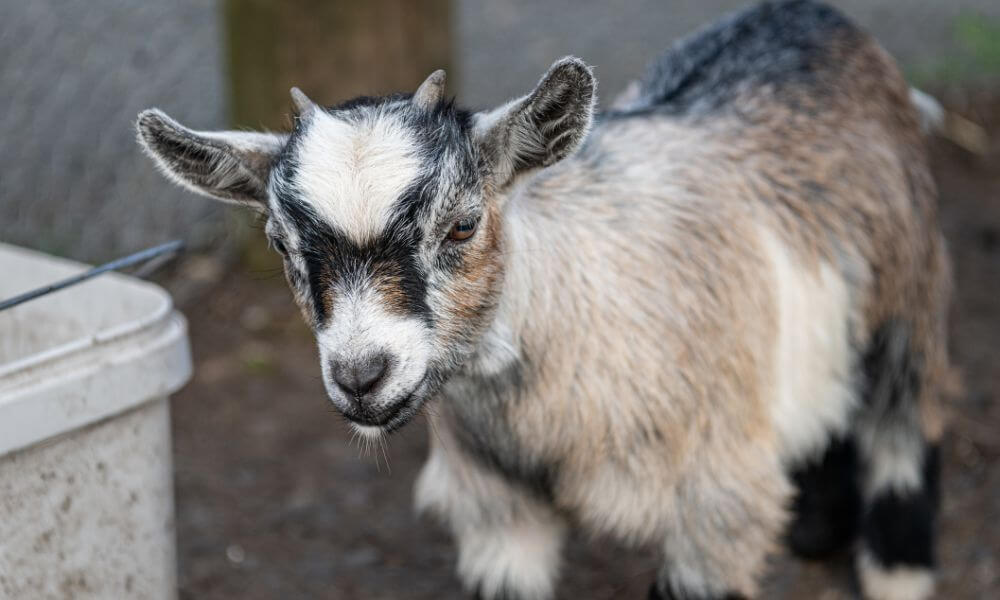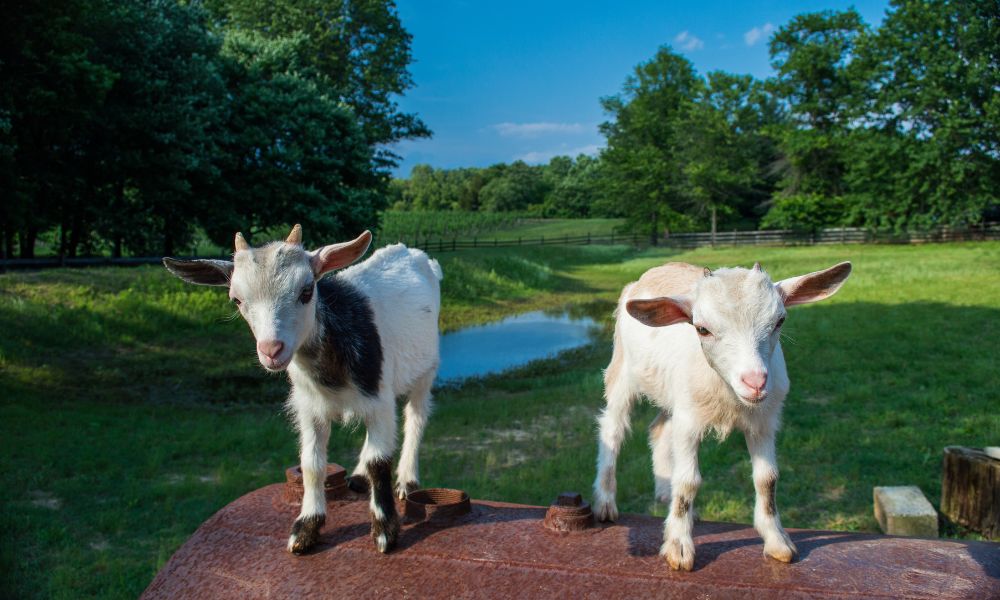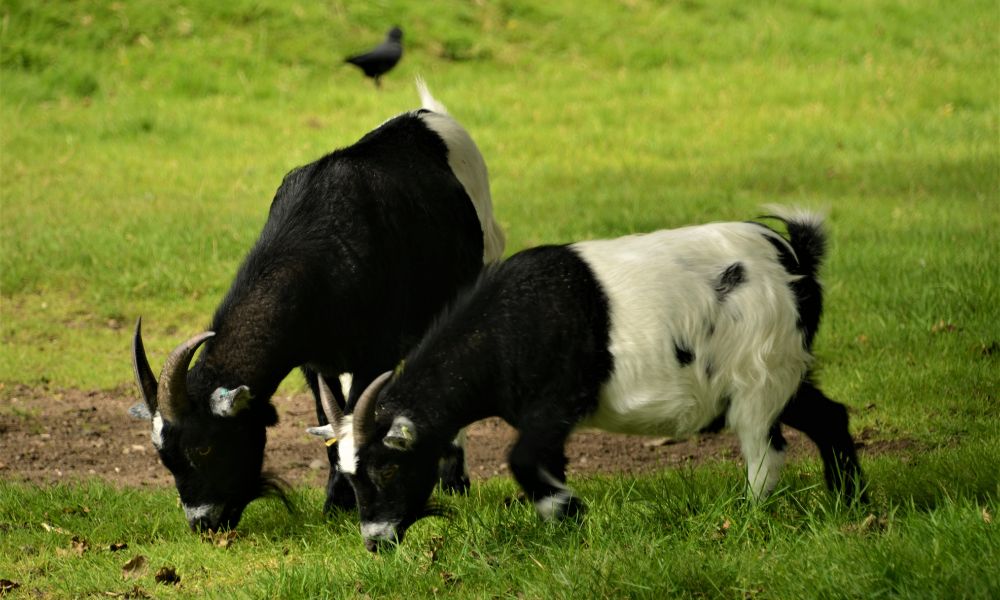Pygmy goats are a dwarf goat breed prized for their friendly and easygoing personalities as well as meat and milk.
They easily adapt to most climates and need a fun environment to expend all their playful energy.
Pygmys are often held as pets because their small size makes them easy to handle in smaller pastures.
Because of their docile nature, they’re usually safe around children and other pets.

What factors determine a Pygmy goat’s weight?

As with all animals, Pygmy goats can vary greatly in weight depending on factors in their environment.
Everything from what they eat, what the weather’s like, and how they’re treated can make them either bulk up or lose weight.
Diet
Probably the most important factor related to Pygmy goat weight is their diet.
Pygmys need to eat a balanced diet with all the right nutrients, vitamins, and minerals.
Eating the right amount of food is just as important as eating the right food too.
Foods that are good for Pygmy goats:
- Grains (corn, oats, and mixed grains)
- Legumes
- Forages (weeds, grass, small trees, and shrubs)
- Salt licks
- Hay
- Vegetables
- Fruit (except citrus)
Pygmy goats will always be healthier eating foods that are found in their natural habitat.
Letting them graze in a large area will help their diet so much that you might not need to supplement it much, if at all.

Another oft-overlooked diet factor is fresh water.
Goats can survive for relatively long periods without water, but if you want them to remain as healthy as possible, you should provide them with plenty of clean water.
Living conditions
Because Pygmy goats are very adventurous and fun-loving, they need an environment to fit.
Pygmys love running around and climbing on things, so be careful to make their area Pygmy-proof.
Goats have been known to climb trees, cars, and even houses.
Often the best option is to build them a wooden playground similar to what you see in parks.
You can build them an ideal shelter that is practical as both a sleeping place and a playground.
Goats are social creatures and can get lonely if they don’t have any other goat friends around.
Don’t overcrowd your pasture, but make sure your goats have enough friends around to keep them happy.
Climate isn’t much of a factor for goats since they’re resilient and can tolerate a wide range of temperatures.
For Pygmy goats, you should still keep them in a temperate climate and provide shelter for very hot and cold times.
Parasites
Goats are very susceptible to parasites like worms because they graze all around and eat almost anything.
Parasites will feed off of the goat’s food and blood, leaving them weak and undernourished.
Thankfully, Pygmy goats are known for their resistance to parasites and diseases.
Even so, you should always keep an eye on your Pygmys for any signs of parasites.
A sudden loss in weight, loss of appetite, or change in behavior are all signs that warrant investigating.
How can you see if a Pygmy goat is overweight or underweight?
You should always be keeping an eye on your Pygmy goats’ weight and adjusting factors to match.
Because of their unusual proportions, it’s not immediately obvious how to determine their body fat percentages.
Here’s what you should look for.
The simplest way to see if a goat is overweight or underweight is to run your hand along their back from their neck down to their tail.
If you can feel individual vertebras without any padding between the bones and skin, then your goat is likely underweight.
This works similarly for checking if they’re overweight: run your hand down their back, and if you can’t feel individual bones then they’re likely overweight.
Fat generally collects around a goat’s hip bones and neck.
If the bones in those areas are very prominent or if those areas are very round and with obvious fat covering the bones, then your goat needs some help to gain or lose weight.
Don’t judge their weight based on their belly size, since this can change drastically throughout the day depending on their feeding schedule.
A goat’s weight will also fluctuate throughout the year depending on the season, age, breeding cycle, pregnancy, and several other factors.
What should I do if my Pygmy goat is underweight?
If you’ve completed the above inspection and determined your goat is underweight, then you should immediately take the following measures:
- Ensure they have enough healthy feed (grains, natural forages, hay, etc).
- Supplement their diet with vitamins and minerals.
- Check their water source for cleanliness.
- Deworm them in case they have any parasites.
- Check for any other environmental factors that may not be good for them.
In extreme cases, always refer to a vet before it’s too late.
They are experts and can easily diagnose what the problem is.
What should I do if my Pygmy goat is overweight?
If your Pygmy goat is prominently overweight and there’s no explanation for the extra weight, then you should be taking the following steps:
- Measure out their food to ensure they’re not eating too much.
- Feed them fewer grains and processed mixes.
- Feed them more forages and other natural food sources that aren’t high in carbohydrates.
- Ensure they have enough space to exercise and expend energy. Having other goats around helps them exercise through play.
Remember to take the steps gradually, unless the obesity is absolutely life-threatening.
Too sudden of a change can have adverse health effects and hurt your goat more than they help.
Pygmy goats are lovable little pets that don’t require a lot of help to stay healthy as long as take some basic steps to provide them with the right environment to flourish.
Even if you’re not keeping them for their milk or meat, a balanced diet and good environment will leave them much happier and with a healthy weight.
